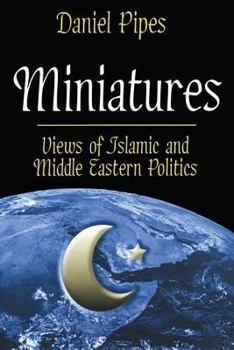Miniatures: Views of Islamic and Middle Eastern Politics
The volatility of Muslim and Middle Eastern politics has made these interrelated topics an overriding preoccupation of world and especially U.S. politics. Perhaps no region of the world has ever so dominated the American public discourse as the Middle East does today. As Daniel Pipes shows, this results mainly, but not exclusively, from the attacks of September 11, 2001 and the ensuing war on terrorism. Other sources of trouble include militant Islam, Muslims in the West, the Arab-Israeli conflict, the Iraq situation, relations with Saudi Arabia, the price of oil and gas, and U.S. policy toward all these issues. These are the central themes of the roughly one hundred essays in Daniel Pipes' Miniatures: Views of Islamic and Middle Eastern Politics.As Pipes notes, the Islamist war against America preceded the events of 9/11. Nevertheless, response to the earlier attacks had been inconsistent and somewhat nonchalant. Pipes shows how the State Department's annual report on Patterns of Global Terrorism veers into unreliability and even falsehood. He explains the problem in George W. Bush trying to decide what is true Islam and what not, in U.S. academics hiding the true meaning of the word "jihad," and in seventh-grade textbooks proselytizing for Islam. Pipes demonstrates that many seemingly devout Islamists are in fact impious frauds. When it comes to the Arab-Israeli conflict, Pipes indicates how the failure of the Oslo process could be discerned as early as 1994 and he shows how Yasir Arafat speaks one way to Arabs and another way to Israelis.This important collection, by one of the foremost experts in the field, presents original insights, accessibly written for Middle East specialists, political scientists, policymakers, journalists, and the interested public.
Format:Hardcover
Language:English
ISBN:0765802155
ISBN13:9780765802156
Release Date:October 2003
Publisher:Routledge
Length:286 Pages
Weight:1.30 lbs.
Dimensions:1.1" x 6.3" x 9.3"
Customer Reviews
3 ratings
Excellent summations with one logic problem
Published by Thriftbooks.com User , 20 years ago
For several years, Daniel Pipes has pondered subjects like terrorism, radical Islam, anti-Semitism, the collusion of the Left and Islamists and chances for a realistic peace in the Mideast. He is a regular contributor to Jewish World Review (subscribe - it's free!) and startles the reader with clarity and the ability to see beyond the headlines and sound bites. Here, he takes yet another look at the future with regard to radical and moderate Islam. Pipe journeys from the past to the present. He suggests ways of breaking the stalemate but falters when discussing "moderate" Muslims and their ability to change the status quo. One should remember that all Muslims are fundamentalists in that they interpret the Q'ran literally and view it as a guide for modern living. There is no liberal branch of Islam like Reform Judaism or Unitarianism. Another seemingly tabboo subject is tribalism which is at the core of many problems. The failure of modern Muslim states is directly due to the primary allegiance given to Islam and the tribe. Objections or protests are seen as disloyal at best, heretical at worst. When reality is viewed through a rigid religious or ideological prism only cosmetic changes are possible. Compare the Holy Roman Empire and the Renaissance Europe that blossomed once the hold of the Church over every aspect of society declined. The society questioned itself and found a new pathway. This internal questioning has yet to occur in Islamic societies that continue to seatch the past for guidance in the future. Pipes (and most of us) envisions a future world in which tolerance is the norm. I fear that vision is ephemeral at best.
Thoughtful and informative
Published by Thriftbooks.com User , 20 years ago
I've read several books by Pipes. It's my impression that most of what he says is rather tame and cautious. And that most of what he says is not very controversial. He often has something illuminating in his essays, but much of this is relatively apolitical. At least in this book, I was able to figure out which political party he favored! Now, it is true that Pipes has often said that militant Islamic attacks on Americans were a form of war as opposed to individual criminal acts. He's said that our government ought to take seriously the ideology that has been motivating such attacks, and that we ought to make policy changes in order to win this war and destroy the effectiveness of any enemy forces. Well, our administration has regarded the 9/11 attacks as war. It has tried to destroy the enemy forces. As near as I can tell, what Pipes has advocated here has been fair and reasonable. Pipes feels that the battle is not against Islam but against militant Islamists, a group that can be marginalized and defeated with the help of moderate Muslims. Again, this does not sound all that radical an idea. Pipes is indeed bothered by Islamic militants who manage to pass themselves off as moderates. If they get away with it, Pipes' recommendations will be misimplemented and doomed. I liked the essays and found them informative. Maybe you will as well. But if you were looking for something wild and maybe, um, raging and fuming, you won't find it here.
The lucidity readers have come to expect from Pipes
Published by Thriftbooks.com User , 21 years ago
If you have been following the essays and articles that Pipes has written in numerous newspapers and magazines, you may find this book a bit redundant. However, it is one-stop-purchase if you want a concise overview of the author's social and political views. A must read for all those concerned about the war on terror and its roots. Against the tide, Pipes has spoken out eloquently and urgently. Miniatures is no exception. Highly recommend.






